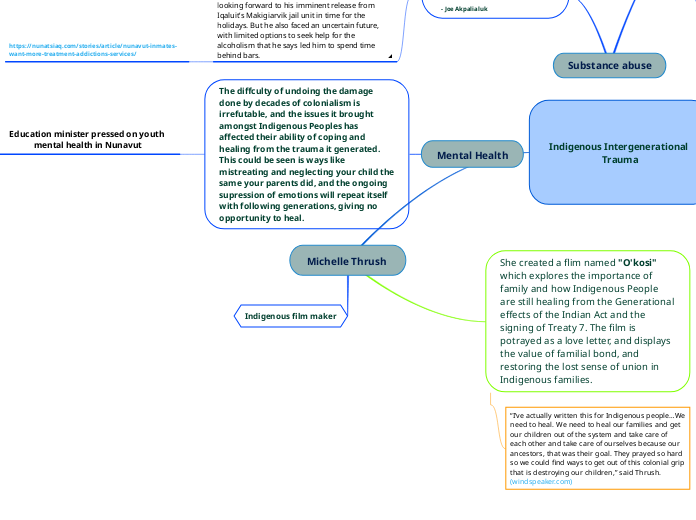Cultural Revitilization
Alicia Dubois
“The way in which we share and learn from the truths and lived experiences of our past is fundamental to how we build our future and strengthen the fabric of our communities.” https://news.gov.bc.ca/
Autumn Cooper
“The power you feel learning your language, there are no words for it, you feel so much more connected to your culture in so many ways because of your language." https://news.gov.bc.ca/
Patricia Monture (Mentor and activist led the way on ideas of justice and equality)
She led the way on ideas involving Indigenous theory, governance, law, responsibility, and social and political inequality. "In my culture, we do not distrust people and make them swear to tell the truth. My people carry an eagle’s feather to symbolize that they will tell the truth." - Patricia Monture
https://windspeaker.com/news/womens-history-month/patricia-monture-mentor-and-activist-led-the-way-on-ideas-of-justice-and-equality
Mental Health
The diffculty of undoing the damage done by decades of colonialism is irrefutable, and the issues it brought amongst Indigenous Peoples has affected their ability of coping and healing from the trauma it generated. This could be seen is ways like mistreating and neglecting your child the same your parents did, and the ongoing supression of emotions will repeat itself with following generations, giving no opportunity to heal.
Education minister pressed on youth mental health in Nunavut
https://nunatsiaq.com/stories/article/sen-patterson-calls-for-action-not-reports-on-suicide-prevention/
Nunavut Sen. Dennis Patterson is calling for more action on suicide prevention, and less focus on studies. “We cannot begin to heal unless there’s concrete actions taken." - Dennis Patterson
The lack of effective programs geared towards mental health in Indigenous communities needs to be confronted.
“Iqaluit-Sinaa MLA Janet Pitsiulaaq Brewster asked Education Minister Pamela Gross this week what her department is doing to improve programming geared towards youth mental health in Nunavut.” https://nunatsiaq.com/stories/article/education-minister-pressed-on-youth-mental-health-in-nunavut/
“We know that the programs that have been implemented for a number of years in Nunavut are not having the desired impact,” - Pitsiulaaq Brewster
Substance abuse
“If I get released in Pang, I will be going back to jail right away”
- Joe Akpalialuk
At Iqaluit’s minimum security jail, Makigiarvik, some inmates say they need more help treating their addictions so they can stay out of jail. There is a long waiting period to access the jail’s substance abuse program, and no treatment centres once inmates get out. Joe Akpalialuk was looking forward to his imminent release from Iqaluit’s Makigiarvik jail unit in time for the holidays. But he also faced an uncertain future, with limited options to seek help for the alcoholism that he says led him to spend time behind bars.
https://nunatsiaq.com/stories/article/nunavut-inmates-want-more-treatment-addictions-services/
Nunavut inmates want more treatment, addictions services
Trauma manifests in various ways, and each person has their own method of coping. It is commonly found that Indigenous Peoples have (and continue) to cope with their trauma through drugs and alchohol consumption, which leads to consequences like incarceration and bad health.
https://substanceabusepolicy.biomedcentral.com/
"Like other Indigenous people around the world, First Nations, Métis, and Inuit face significant challenges with trauma – cumulative throughout an individual’s life, as well as collective (encompassing that experienced by one’s family, community, nation- as well as the surrounding natural world) and intergenerational – that leads to substance use and Addiction."
Michelle Thrush
Indigenous film maker
She created a flim named "O'kosi" which explores the importance of family and how Indigenous People are still healing from the Generational effects of the Indian Act and the signing of Treaty 7. The film is potrayed as a love letter, and displays the value of familial bond, and restoring the lost sense of union in Indigenous families.
“I’ve actually written this for Indigenous people…We need to heal. We need to heal our families and get our children out of the system and take care of each other and take care of ourselves because our ancestors, that was their goal. They prayed so hard so we could find ways to get out of this colonial grip that is destroying our children,” said Thrush. (windspeaker.com)
Indigenous Intergenerational Trauma
Many Indigenous communities across Canada have been impacted by the effects of systemic discrimination that's been passed on through generations. The residual impact left from the Residential School system continues to affect Indigenous Peoples way of being. From our education and justice system to the cultural assimiliation forced upon them, Indigenous communitites have suffered greatly.
What I know
Subtopic

